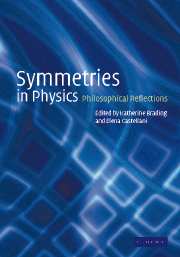Book contents
- Frontmatter
- Contents
- List of contributors
- Preface
- Copyright acknowledgements
- 1 Introduction
- Part I Continuous symmetries
- Part II Discrete symmetries
- 11 Classic texts: extracts from Leibniz, Kant, and Black
- 12 Understanding permutation symmetry
- 13 Quarticles and the identity of indiscernibles
- 14 Handedness, parity violation, and the reality of space
- 15 Mirror symmetry: what is it for a relational space to be orientable?
- 16 Physics and Leibniz's principles
- Part III Symmetry breaking
- Part IV General interpretative issues
- Index
13 - Quarticles and the identity of indiscernibles
Published online by Cambridge University Press: 08 October 2009
- Frontmatter
- Contents
- List of contributors
- Preface
- Copyright acknowledgements
- 1 Introduction
- Part I Continuous symmetries
- Part II Discrete symmetries
- 11 Classic texts: extracts from Leibniz, Kant, and Black
- 12 Understanding permutation symmetry
- 13 Quarticles and the identity of indiscernibles
- 14 Handedness, parity violation, and the reality of space
- 15 Mirror symmetry: what is it for a relational space to be orientable?
- 16 Physics and Leibniz's principles
- Part III Symmetry breaking
- Part IV General interpretative issues
- Index
Summary
Introduction
In sections 6 and 7 of their paper in this volume, French and Rickles raise the question of the logical relations between the indistinguishability postulate (IP) and the various senses in which particles might fail to be individuals. In section 6 they refer to the convincing arguments of French and Redhead (1988) and of Butterfield (1993) that IP does not logically entail non-individuality, understood several ways – even though, as all seem to concede, there is something perverse about taking bosons and fermions to be individuals. Going the other way, the possibility of IP violating ‘quons’ (Greenberg, 1991) shows that if non-individuality is taken to mean the absence of continuous distinguishing trajectories, characteristic of standard quantum mechanics (QM), then non-individuality does not entail IP. Nor, as French and Rickles point out, do substance or haecceity views of individuality.
But what if we conceive of individuality in terms of the Principle of the Identity of Indiscernibles (PII)? First, French and Redhead (1988) and Butterfield (1993) have given theorems showing that bosons and fermions violate PII, while the former have also demonstrated violations of PII in the case of a certain paraparticle state. But these cases, as I will explain (and as French and Rickles point out), cover just a very few of the possible kinds of quantum particles, and so for each kind the question arises as to whether it violates PII.
- Type
- Chapter
- Information
- Symmetries in PhysicsPhilosophical Reflections, pp. 239 - 249Publisher: Cambridge University PressPrint publication year: 2003
- 10
- Cited by



